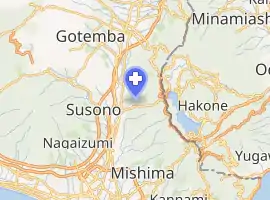Suruga Sanatorium
Suruga Sanatorium (国立駿河療養所) or National Suruga Sanatorium is a national sanatorium for leprosy and ex-leprosy patients situated in Gotemba, Shizuoka, Japan since 1945.
| National Suruga Sanatorium | |
|---|---|

| |
| Geography | |
| Location | 1915 Kōyama, Gotenba, Shizuoka, Japan |
| Organisation | |
| Care system | Healthcare of those who had leprosy |
| Type | National hospital run by Ministry of Health, Labour and Welfare (Japan) |
| History | |
| Opened | 1945 |
| Links | |
| Website | hosp.go.jp/~suruga2 |
| Lists | Hospitals in Japan |
History
After the start of the Second Sino-Japanese War (July 7, 1937- ), wounded soldiers became problematic and Matsuki Miyazaki proposed in 1937 that those who developed leprosy, during military service, should be given treatment and pension in the same degree as those who developed tuberculosis during service.[1]
The following is a timeline of events:
- 1940: Treatment for leprosy in Japanese soldiers was approved.
- 1942: A sanatorium was planned and National Sanatorium Wounded Soldiers' Suruga Sanatorium was established on December 15, 1944.
- December 15, 1944: Sanatorium opened.
- June 10, 1945: The first patient was hospitalized.
- December 1, 1945: The facility became National Suruga Sanatorium.
- April 1996: The 1953 Leprosy Prevention Law was abolished.
- July 1998: The trial for compensation started.
- May 11, 2001: The trial for compensation ruled that the previous Leprosy Prevention was unconstitutional.
- May 25, 2001: The trial for compensation was confirmed. The compensation of 8,000,000 yen to 14,000,000 yen was given to patients depending on the duration of their incarceration.
Space
The site covered 364.680 hectares (900 acres). The buildings covered 22.241 hectares (50 acres)
See also
References
- War and leprosy (1948), Miyazaki M. Repura 17,1-7.
- Fukken eno Jitsugetsu(2001), Nyushosha Kyogikai, Koyo Shuppansha, Tokyo ISBN 4-87662-302-3
- http://www.eonet.ne.jp/~libell/4ryouyousyo.html#itirannhyou Archived 2009-06-23 at the Wayback Machine Number of in-patients(residents)2009.12.20
External links
- Official website (in Japanese)
This article is issued from Wikipedia. The text is licensed under Creative Commons - Attribution - Sharealike. Additional terms may apply for the media files.